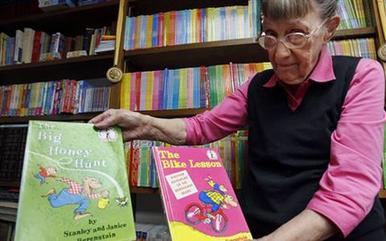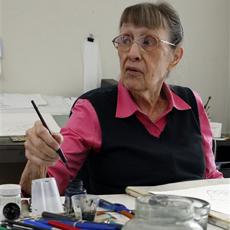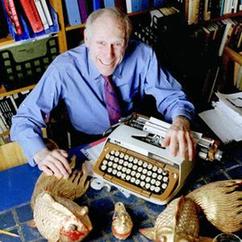
BOB DOUGHTY: Welcome to THIS IS AMERICA in VOA Special English. I'm Bob Doughty.
FAITH LAPIDUS: And I'm Faith Lapidus. This week on our program, we tell you about a website that connects people around the world through books. Then, we look back at the lives of two people from the book world. Jan Berenstain was a children's author and illustrator. Barney Rosset was an independent publisher who fought against censorship to publish books like "Lady Chatterley's Lover."
(MUSIC)
BOB DOUGHTY: Reading can be a social activity. Think of the people who belong to book groups. They choose books to read and then meet to discuss them. Now, the website BookCrossing.com turns the page on the traditional idea of a book group.
Members go on the site and register books they own that they would like to share. BookCrossing provides an identifying number to stick inside the book. Then the person "releases" the book by leaving it in a public place. The hope is that the book will have an adventure, traveling far and wide with each new reader who finds it.
Bruce Pederson is the chief executive of BookCrossing. He and his wife Heather launched the site with Ron Hornbaker in 2001.
BRUCE PEDERSON: "One of the founding principles was the two things that change your life are the people you meet and books you read."
BookCrossing, Mr Pederson says, combines both.
FAITH LAPIDUS: Members leave books on park benches and buses, in train stations and coffee shops. BookCrossers, as they are known, hope that whoever finds their book will go to the site and record where they found it.
People who find a book can also leave a journal entry describing what they thought of it. E-mails are then sent to the BookCrossers to keep them updated about where their books have been found. Bruce Pederson says the idea is for people not to be selfish by keeping a book to gather dust on a shelf at home.
BRUCE PEDERSON: "BookCrossing is a tool that allows you to uniquely identify your book and follow it on its journey. We all have this life-changing literature that we tend to keep on our shelf and BookCrossing encourages its members to read and release and not be 'shelf-ish.'"
BOB DOUGHTY: The read and release idea of BookCrossing has spread. The site now has more than one million members in more than 135 countries.
Among them is Mona Orvig of Hillsboro, Texas, a city of 8,000 people. She joined the site in 2002. Since then she has exchanged more than 200 books, including one that made its way around the Americas.
MONA ORVIG: "I left it here in Texas and it went to Los Angeles and then Miami and then it went to Guatemala and El Salvador and Cuba and the last report I heard it was in Canada. Those are places I will never see. And it just fascinates me that a book that was in my house and that I read and enjoyed has gone to all those places."
FAITH LAPIDUS: The BookCrossing website also allows people to search in their area for places where books are being released. There is no cost to join or use BookCrossing, but users can pay to get additional services.
Andy Johns is a BookCrossing member from Alexandria, Virginia.
ANDY JOHNS: "There was a paperback Star Trek novel that I left on an ATM [automated teller machine] near my office and six months later it popped up in a train station in Beijing. I know I've had one that I left by a fountain in Alexandria that showed up in South Africa."
Mona Orvig says what she likes most about BookCrossing is the people. Andy Johns agrees.
ANDY JOHNS: "I've become friends with people literally around the world. I've got some really great friendships with people as far away as Canberra, Australia, and Cardiff, Whales."
Ms Orvig says she too has made friends throughout the world on BookCrossing. Friends from Australia have even stayed at her home in Texas.
MONA ORVIG: "I think it's made the world smaller. I'm not a traveler, I don't go many places but since BookCrossing I have learned so much about the world and people, and this sounds cliche, but we're so much alike.
"Before, when I heard of something happening somewhere in the world an earthquake or a tragedy, I'd think, 'Oh, those poor people,' and I'd move along. And now when something happens, I'm thinking, 'Oh, how's Debbie? How's Linda? How's my other friends that happen to live in that town.'"
Ms Orvig says she has also gotten her grandchildren involved in BookCrossing.
MONA ORVIG: "They love it and it kind of points out that I think books are valuable and that's not a bad lesson for a small child to be learning."
BOB DOUGHTY: Co-founder Bruce Pederson says BookCrossing is part of a trend among people who want to get back to the "real" and not the virtual, or electronic.
BRUCE PEDERSON: "There is this constant battle for our minds' share of screen time and there's always another app, but there's just something basic and foundational about reading."
(MUSIC)
FAITH LAPIDUS: Jan Berenstain died last month after a stroke. She was 88 years old. Her husband, Stan Berenstain, died in 2005. Together they created more than 300 picture books for young readers.

Their first book was released in 1962. Since then the Berenstain Bears series has sold more than 260 million copies. The books have been translated into other languages and are one of the best selling children's series ever.
BOB DOUGHTY: Before the Berenstains became known for children's books, they were known for their cartoon for adults. Their series "It's All in the Family" appeared in popular magazines for more than 30 years.
Their early books for children were edited by Theodor Geisel -- better known as Dr Seuss. He wrote "The Cat in the Hat" and other children's classics.
The popularity of the Berenstain Bears led to animated television shows based on the books.
Many of the stories aim to help guide children through common problems and bring comfort to new experiences, like visiting the dentist. Some people consider the books too simple in their life lessons and too traditional in their family values. But as Jan Berenstain told the Associated Press in 2011, "Family values is what we're all about."
She pointed out that while jokes may not travel well, everyone can understand family humor.
FAITH LAPIDUS: The Berenstain Bears are Mama Bear, Papa Bear and their three little bears. They live in a treehouse in -- wait, someone out there surely knows the answer. They live in a treehouse in Bear Country.
Eleven year-old Grace Deibert of Raleigh, North Carolina, remembers enjoying the books when she was about four or five.
GRACE DEIBERT: "They're really easy to read and there's always a lesson."
She says her favorite book in the series was "The Bear Detectives: The Case of the Missing Pumpkin."
GRACE DEIBERT: "They were missing this pumpkin and they had to go find it and they had funny poems and misconceptions and stuff."
The lesson of the book, she says, was to think before you act.
After Stan Berenstain's death, Jan Berenstain continued to write books with their son, Michael. She was still illustrating until the day before she died on February 24th.
(MUSIC)
BOB DOUGHTY: Barney Rosset died on February 21st, just three months before his 19th birthday. He was an independent publisher and free-speech activist during the middle of the 20th century.

He fought for the right to publish works that are now considered classics. These include books by D.H. Lawrence, Henry Miller, William S. Burroughs and many other authors.
FAITH LAPIDUS: Barney Rosset was born into a wealthy family in Chicago in 1922. He was raised and schooled in a progressive social environment. He became something of a rebel who challenged traditional beliefs.
He attended four colleges before finally graduating. During World War Two, he served in the Army as a photographer in China. After the war he produced a 1949 film called "Strange Victory." It was about black soldiers who returned from the war, only to face racism at home in the United States.
After the war, Barney Rosset lived in Greenwich Village in New York City. The culture was bursting with new ideas in music, art and literature.
BOB DOUGHTY: In 1951, he bought Grove Press, a very small publisher. He welcomed writers whose works did not appeal to the big publishing houses.
In 1959, Grove Press released the full version of "Lady Chatterley's Lover" by D.H. Lawrence. Britain had banned the book for its sexual content. The American edition led to a legal battle over the constitutional right to free expression. Barney Rosset finally won that fight in 1961.
Next he faced a similar legal battle over the book "Tropic of Cancer" by Henry Miller. That case led to a major ruling about free speech by the United States Supreme Court. In 1964, the justices decided that "Tropic of Cancer" was not obscene. They said its "redeeming social value" outweighed its sexual content.
FAITH LAPIDUS: Barney Rosset said literary value -- as opposed to shock value -- was always his main reason for publishing a book. But he admitted that he also enjoyed a chance to assert the Constitution's guarantee of freedom of the press and freedom of speech.
BARNEY ROSSET: "I feel that if people don't have the right to express themselves, first of all, they are not going to be happy, and secondly, they aren't going to develop the creative abilities they have, as scientists, as bankers, as anything."
He said his fighting spirit dated back to his high school years.
BARNEY ROSSET: "I was a cross-country runner. And I didn't get tired very easily. That was my whole thing; it was endurance. It was a similar kind of thing, actually. I believed in freedom of speech. It never entered my head to quit."
BOB DOUGHTY: In recent years, an organization called the National Coalition Against Censorship recognized Barney Rosset's efforts. And the National Book Foundation honored him as a "tenacious champion for writers who were struggling to be read in America."
(MUSIC)
FAITH LAPIDUS: Our program was written and produced by Brianna Blake, with reporting by Adam Philips. I'm Faith Lapidus.
BOB DOUGHTY: And I'm Bob Doughty. Our programs are online with transcripts, MP3s and activities for learning English at voaspecialenglish.com. Join us again next week for THIS IS AMERICA in VOA Special English.
Spock parenting book gets online update
E-readers, tablets to end print era
Lifeline thrown to city's bookstores
Encyclopedias survive by going online
(来源:VOA 编辑:Rosy)
关注和订阅


电话:8610-84883645
传真:8610-84883500
Email: languagetips@chinadaily.com.cn